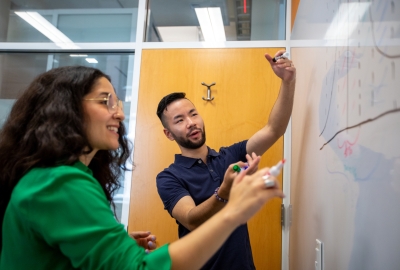
Applications will reopen in January 2027
The highly-selective PRIISM Opportunity Fellowship supports the development of two first year Applied Statistics for Social Science Research MS students during the summer after the first year in their program. Fellows will gain experience and skills by collaborating on data-driven research teams led by PRIISM faculty who are using data to address societal issues.
Beyond the Classroom: The Fellow Experience
As a PRIISM Fellow, you’ll move beyond the textbook and into the field to gain the critical skills of a statistical consultant through direct immersion in high-impact research. You will:
- Join an Active Research Team: Collaborate on projects that match your passion and work on projects that matter going deep into hypothesis formulation, data strategy, and real-world problem-solving.
- Social Impact in Action: Past fellows have worked on research that tackled:
- generative AI that scrubs race-related info from police reports to facilitate race-blind prosecutorial reviews
- identifying barriers that English learners face in accessing curriculum in school.
- comparing data across different cities to analyze COVID-19 case rates over time.
- Build Your Professional Brand: Elevate your career with tailored workshops on resume building, cover letters, and interview mastery.
- Expand Your Network: Attend PRIISM Seminars to connect with experts and explore diverse applications of statistics in policy and science.
Benefits
As a PRIISM fellow, you don't just observe—you contribute and will:
- be matched with a professional research team for the summer semester,
- gain valuable professional experience with a summer salary starting at $11,000, and
- receive dedicated guidance and regular mentorship from a faculty expert.
Who Should Apply?
We are looking for first year Applied Statistics for Social Science Research MS program students who are ready to use their data skills for the greater good.
We strongly encourage you to apply if:
- You are passionate about social impact: You want your research to address real-world challenges and benefit society.
- You bring a unique perspective: PRIISM is dedicated to amplifying voices that have been historically underrepresented in STEM, and preference is given to applicants from these groups. Your background and lived experience are vital to the research we do.
Deadline: Applications must be submitted by January 31, 2027. Don't miss the chance to be part of our next cohort!
Contact steinhardt.a3sr@nyu.edu for additional information.
2025-2026 Fellows
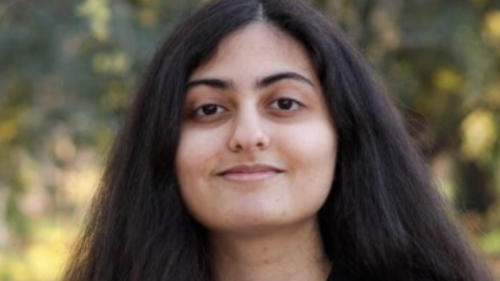
Megha Chouthai
Megha Chouthai grew up traveling between Jersey City and Mumbai. She completed her B.S. at UC San Diego, double-majoring in Cognitive Science (Machine Learning & Neural Computation) and Mathematics–Computer Science. While there, she worked across multiple Extended Reality (XR) research labs, including the Qualcomm Institute, the Arthur C. Clarke Center for Human Imagination, and the Cognitive Science XR Lab under Dr. David Kirsh. She helped launch an XR research initiative in the Systems Neuroscience Lab at UCSD under Dr. Douglas Nitz, serving as a Research Project Manager for a year. She is a masters student in the Applied Statistics for Social Science Research program (expected graduation in May 2027).
Megha enjoys data science because solving problems through code feels like working through a puzzle. She finds deep satisfaction in debugging and iterating to finally make a solution click. She also loves that data science uncovers patterns in large datasets to answer meaningful questions or guide decisions.
In addition, Megha wants her work to have visible, real-world consequences. After years in XR research, she realized she needs to see how technology directly affects people’s lives, drawing her to health-tech. In an era where people operate in isolated bubbles, continuously questioning the broader consequences of what we build is vital, which is why PRIISM’s commitment to meaningful, socially grounded research strongly resonated with her.
She is a fellow at the Computational Policy Lab under the mentorship of Dr. Alexander Chohlas-Wood on a generative-AI project focused on civic etiquette in public spaces. Her favorite, and most challenging, part has been learning how to structure her thinking and documentation while working with a large, complex image dataset. It’s pushed her to return to the fundamentals: clarifying research questions, understanding data collection, and building clean, reproducible workflows. Dr. Chohlas-Wood’s guidance, especially around terminal-based programming and strong coding practices, has made the process both rigorous and exciting.
After graduation, Megha hopes to work in consulting or at a mission-driven mid-sized startup where she can contribute to meaningful, user-focused work. She anticipates pursuing a Ph.D. later, but wants to gain industry experience first to better understand the questions she wants to investigate. Ultimately, she wants to build a career that uses data and technology to create positive social impact.
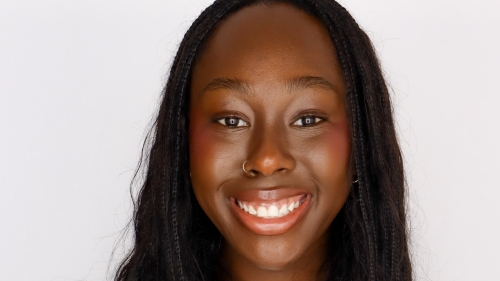
Michelle Lamptey
Michelle Lamptey is a first generation Ghanaian-American who comes from a big family and a supportive community in metro Atlanta, Georgia. She grew up volunteering at local churches and still volunteers heavily at her church whenever she is in the area. As an undergrad, Michelle studied sociology with a minor in criminal justice. During this time she created a social justice campaign about the harms of using facial recognition technology in majority minority cities given the possibility that this can lead to unnecessary and sometimes fatal interactions with police. She also worked on a proposal seeking to understand the ways the student loan forgiveness could and would affect the ability for minorities to accrue wealth through homeownership.
Michelle is currently a part-time student (expected graduation 2029) in the Applied Statistics for Social Science Research Program studying data science for social impact. Her career goal is to collect, curate, and analyze data that improves social policies. Given the misuse and mistrust of data she would love to serve as a bipartisan, unbiased researcher whose goal is to portray and disseminate information to the public as accurately and earnestly as possible. Michelle is also interested in the science of data visualization. In today’s content driven world, data visualization is paramount to driving social change; information must be both quickly comprehensible and visually engaging to capture people’s interest. Overall she'd like her work to lead to greater understanding of the complexity of the human experience in order to decrease divisiveness.
Michelle’s fellowship is with Dr. Alexander Chohlas-Wood at the Computational Policy Lab, which studies the impact of policy choices with data science techniques. The lab aims to better the lives of those impacted by inefficient and unfair systems and practices by bringing a computational perspective to public policy. Michelle’s favorite thing about mentoring with Dr. Chohlas-Wood’s is the novel and impactful nature of the work. His research exposes that reporting on police misconduct ranges from being sparse and gatekept to virtually nonexistent. This lack of data makes it difficult for those fighting to prevent misconduct from providing empirical support for their claims. It was shocking to her that in this day and age that lack of accountability can still exist.
2024-2025 Fellows
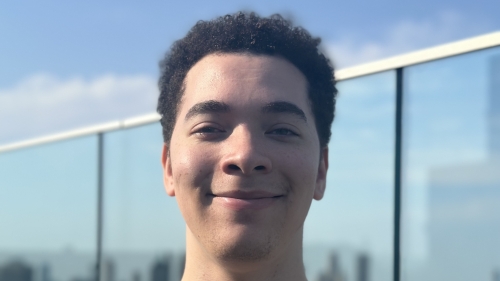
Javae Elliott
Javae Elliott grew up in Saratoga Springs in upstate New York. He graduated from NYU in May 2023 with a bachelor’s in computer science and data science. During his time as an undergraduate, he worked as a research assistant gathering data for causal research projects. He is most passionate about understanding systems and phenomena that shift culture and media. He is currently in the Applied Statistics for Social Science Research program and on track to graduate in May 2026.
Javae is interested in the potential legality and social impact of the mass use of “AI”. He aspires for a job where he can use data to make well-defended arguments for political, economic, or social decisions and to ultimately see how this data-based decision making has positively impacted communities.
Javae believes data science is a tool used to ingest a lot of information to understand aspects of how the world works. He enjoys shaping phenomena into presentable findings and sharing them with others. Javae cares about social impact because all decisions have consequences and understanding these consequences is crucial to being able to minimize disparities across communities. He also enjoys being able to see the outcomes of his efforts. He believes social impact is visible in how we see our history, and how we see each other through media.
Javae’s fellowship is with Dr. Alexander Chohlas-Wood at the Computational Policy Lab at the Harvard Kennedy School, which studies the impact of policy choices with data science techniques. The lab aims to better the lives of those impacted by inefficient and unfair systems and practices by bringing a computational perspective to public policy. So far, Javae has enjoyed problem solving and talking through research questions. He’s excited to learn more to support their goals in criminal justice, education, and more.
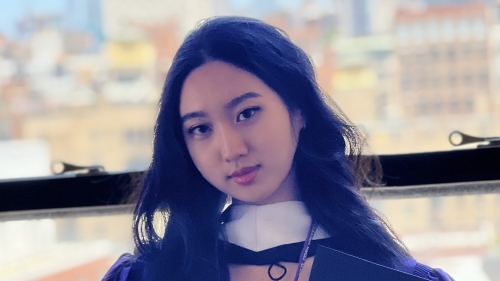
Ruiting Shen
Ruiting Shen came from a background in developmental psychology. From her previous MA in Human Development Research and Policy at NYU and her research experience in the Infant Action Lab at NYU, which focuses on studying early learning, she has developed an interest in the fascinating human learning process and how it can shed light on AI learning and learning outcome assessments. Ruiting is in the A3SR program and plans to graduate in the spring of 2026.
Ruiting hopes to apply different statistical models and tools to gain a deeper understanding of the human learning process and learning outcome assessment (test-taking process and outcome).To achieve that, she hopes to pursue a higher degree in applied statistics or quantitative social science to develop the skills needed to uncover a fuller picture of these complex processes.
Ruiting sees data as a beautiful language that allows us to craft compelling stories about the world around us. She enjoys experimenting with different models to transform complex processes into something organized and tangible, revealing insights that might otherwise go unnoticed.
Recognizing the significant role that various assessments play in shaping learning experiences and providing valuable feedback, Ruiting hopes to use her work to improve educational practices and or shed light on the human learning process. She aims to refine the way tests are designed and interpreted to ensure they not only measure human and/or AI responses accurately but inform strategies they make along in ways that can support learner's development.
Since starting work with Dr. Klint Kanopka, Ruiting has learned various IRT (Item Response Theory) models and machine learning methods used in psychometrics. She feels it is exciting to explore how different models and parameters can help analyze test-takers' responses, providing insights into the testing process, item characteristics, and individual abilities. She looks forward to uncovering the stories behind the data and gaining a deeper understanding of assessment through future project work.
2023-2024 Fellows
Valentina Litang
Valentina Litang was born and raised in the Dominican Republic and lived in Florida during high school and college. She did her undergrad at the University of Florida, and she graduated with degrees in economics and advertising. Upon graduating she moved to NYC and has been working in market research ever since. Valentina is pursuing an MS in Applied Statistics for Social Change and aims to graduate in the Spring of 2025. She hopes to work in the realm of data analysis with a focus on social change and policy. She is most passionate about education policy and making sure all children have access to equitable education.
Valentina enjoys working in data science because it allows for a concrete and quantifiable way of seeing the world and measuring change over time. She cares about social impact because she cares about humanity. It is her belief that, through small actions and decisions, we have the power to steer society in a positive, equitable direction. She also believes we are responsible for making the most of the time between now and the future.
Valentina’s fellowship is at the Cash Transfer Lab (CTL), a center whose mission is to build an evidence base regarding cash transfer policies, with Dr. Sarah Cowan, founder and executive director of CTL, social demographer, and Assistant Professor of Sociology at NYU. Valentina is excited to learn from Dr. Cowan about cash transfers and to see how this experience will help her work toward her career goals.
Jayce Helpley
Jayce Helpley is from the Hudson Valley region of upstate New York. They graduated from NYU in May 2022 with a bachelor’s degree in sociology and a minor in mathematics. During their undergraduate career, they interned at multiple policy research institutes, supporting projects related to workforce development programming and reducing people’s involvement in the criminal legal system. Since September 2022, Jayce has worked as a research assistant at MDRC, where they have engaged in research related to child support programs, reconnecting young people to education and employment, and participatory research methods.
Jayce is astonished by the sheer amount of information that is available and what data scientists are able to do with it. They enjoy being able to find data that relates to a given research question, wrangling it into a more analyzable format, and presenting findings in a way that’s understandable to non-researchers. They look forward to honing these skills during their graduate education.
Many government policies and private institutions produce serious inequities between groups — and it doesn’t have to be that way. Ultimately, Jayce is interested in social science research because of its ability to investigate whether disparities exist, and when they do, what we can do to reduce or even eliminate them. Long term, Jayce plans to continue to do research with the goal of harnessing data to investigate processes that contribute to social stratification and identify policies that may increase upward social mobility within and across generations.
Jayce’s fellowship is with the Litmus program at the NYU Marron Institute of Urban Management, which partners with public agencies in an effort to improve their performance. So far, Jayce has especially enjoyed how collaborative the team has been; it’s an amazing reminder that complex social issues can’t be solved by one person and that we think best when we work with others.
Jayce is currently a master’s student in the Applied Statistics for Social Science Research program and expects to graduate in December 2025.
2022-2023 Fellows
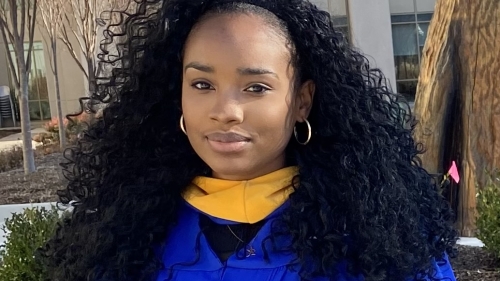
Laurné Jones
Laurné Jones was born and raised in New Orleans, LA. She holds a Master's in Analytics from American University and a Bachelor's in Finance from Southern University and A&M College. While pursuing her first master's, she had the honor of serving as a Secondary Math Teacher in New Orleans, Houston, TX and Washington D.C. For the past four years, she has worked mainly in the government consulting space as a Data Scientist. She is currently a first-year master's student in the Applied Statistics for Social Science Research (A3SR) program, with a concentration in Data Science for Social Impact on track to graduate in the Spring of 2024.
After some years working as a Data Scientist, Laurné understands how much more impact she can have when applying data science and analytics to societal problems. Through the A3SR program, she will gain expertise in applying her analytical skills to more meaningful problems as well as exposure to research methodologies that will prepare her for potential doctoral research or private industry work.
Laurné enjoys solving puzzles, and looks at data science as a huge puzzle. Whether it's coming up with a data question, gathering and interpreting data, or deriving next steps, she thinks it's exciting to discover and validate assumptions and take those insights to solve a problem or create new opportunities.
Laurné’s fellowship is with Dr. Michael Kieffer at the Center for the Success of English Learners (CSEL), a multi-institution Institute of Education Sciences-funded Research & Development center engaged in identifying barriers that English learners face in accessing the core curriculum in middle and high school. Using administrative data from the Research Alliance for New York City Schools and original large-scale survey data, the project will explore inequities in course access, their predictors, and their consequences. Since joining the CSEL project, she’s been most interested in learning more about the perspective of English Language learners. She is particularly interested in learning more about the special education and gifted learners that fall within this population and how their outcomes are impacted by the lack of access to an expanded curriculum.
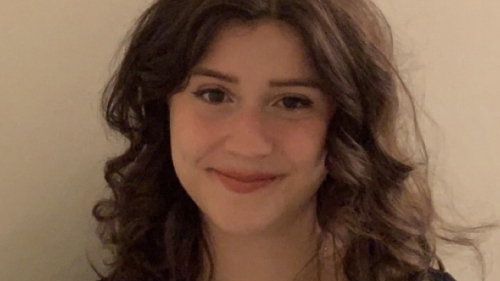
Hailie Dono
Hailie Dono grew up on the south shore of Long Island in the village of Patchogue. In May of 2022, she graduated with a Bachelor of Arts in Economics and Mathematics from Hofstra University in Nassau County. It was there that she had her first internship experience with CARECEN, a nonprofit based on Long Island, New York that provides legal services and education to the immigrant community -- an experience that solidified her passion for using data science for social impact. She is currently in the MS in Applied Statistics for Social Science Research program and is projected to graduate in May 2024. Her aspirations for a future career lie in research, specifically research that investigates disparities in data between different marginalized groups. Hailie also hopes to work alongside another nonprofit, where she can see the impact of her work in real time by providing these groups with findings that they can then utilize with an overarching goal of dismantling these systems in place that cause gaps in data.
Aside from the mathematics involved that she adores as a former math major, Hailie is particularly interested in data science as there is a story behind these data sets and different plottings. There is an underlying trend, hypothesis or story to be told and to her, data science acts as a translator of sorts to convey these hidden messages. She thinks there is something so exciting about the fact that there is plenty of data waiting in the world for someone in data science to transcribe it. It is also important to make sure we are telling the whole story, as statistics can be used to lie, an ethical approach to data science can help intercept harmful social impact.
Growing up on Long Island is a polarizing experience. There are extremes at every corner. For instance, Hailie received her undergraduate degree at a school neatly situated between one of the richest neighborhoods and one of the poorest. It's difficult to look around and not see these inequities, in health, economic resources and power, at every corner. She hopes to be able to shed light on these unequal systems in place and better the lives of specific groups through her work.
Hailie’s fellowship is at the Cash Transfer Lab (CTL), a center whose mission is to build an evidence base regarding cash transfer policies, with Dr. Robert Pickett who works on statistical approaches to identify the causal effects of the Alaskan Permanent Fund Dividend. She is excited to be a part of the CTL where there are researchers from many diverse backgrounds of study and a multitude of different topic projects all within one lab. She is so grateful to be exposed to so many different research projects in one place. She is also excited to be able to draw back on my undergraduate studies in economics as she dives deeper into Alaska's Permanent Fund Dividend and its implications on Universal Basic Income.
2021-2022 Fellows
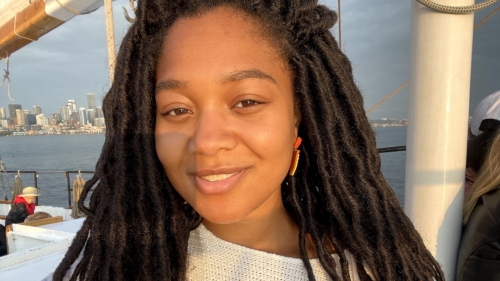
Karen D. Britt
Karen D. Britt is from the Bronx. She graduated in May 2021 from CUNY Lehman College with a BA in Sociology, minoring in data science. She has had multiple data analytic internships, including a data science five-week program with Microsoft. Karen is currently a first-year masters’ student in the applied statistics program and will graduate in May of 2023. Her career goals are to conduct meaningful research of health disparities in New York City that can assist policymakers in creating programs that will help improve the quality of life for all New Yorkers regardless of where they live. Karen enjoys how data science can be used to learn more about the world with a more logical lens. She thinks it’s amazing how we can use data to make more informed decisions that lead to a more impactful outcome. She cares about social impact because we are in a time where there are the means to give everyone the resources they need to thrive. Quality of life shouldn’t matter depending on what town or neighborhood you live in. It’s important that the social impact made is positive and improves the lives of those who are impacted. Karen is a fellow on the Illinois Department of Corrections (IDOC) project with NYU’s Marron Institute of Urban Management. She enjoys working on the project thus far because she is able to conduct research that will help improve the prison system.
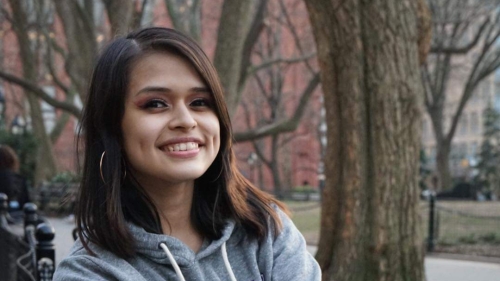
Jaylene Quito
Jaylene Quito was born and raised in NYC, specifically in East Harlem. Growing up, she always had a passion for helping out people within her community. Due to this passion, she tried to pursue a degree in social work but realized her calling was in the research field. She received a BA in Sociology from CUNY Lehman College in the first graduating class of the pandemic, 2020! She has done several research projects and has traveled as far as Barcelona to conduct research. Analyzing data and data visualization are her favorite parts of the research process. She is currently in the Applied Statistics for Social Science Research program and will graduate in May 2023. Jaylene plans to continue being a researcher and has always wanted to find a way to use her skills to help the immigrant and/or mental health population. She has a strong connection with them and would do anything to help their voices be heard. In data science, she enjoys being able to make her research presentable and understandable to anyone. People may not understand the numbers or conclusions made, but being able to mediate that issue is such a rewarding job. People deserve to understand new information given to them and find out how it can benefit them. In terms of social impact, Jaylene has experienced both sides of the coin. Needing the help and being able to give the help. Being brought up by undocumented parents and having one taken away from you because of immigration laws, makes you realize that a lot has to be done in the system. She is just trying to be the change she wants to see. Jaylene is working with the Brito Lab on the COVID-19 & Perinatal Experiences (COPE) Study. From her experience thus far, she has absolutely loved seeing everyone's enthusiasm about the project. There are so many aspects to the project and everyone brings something to it. It's the fact that everything comes together perfectly that makes me excited to continue to work on this project.
2020-2021 Fellows
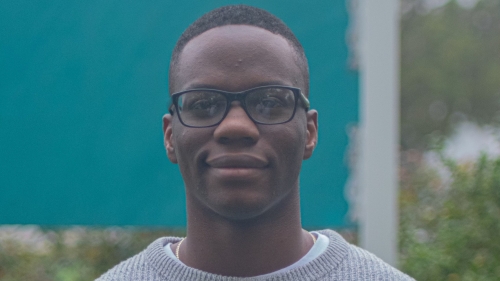
Adrian Harris
Adrian Harris is currently a first-year master's student in the Applied Statistics program. Before coming to NYU, he received a Bachelor of Business Administration from CUNY- Baruch College in Spring 2020. He enjoys working with raw data and transforming it into knowledge that can better the lives of people around him.
As a PRIISM Opportunity Fellow, Adrian has had the opportunity to learn from his mentor, Professor Marc Scott on a research project titled “Tale of Two Cities: London and New York City during the COVID-19 pandemic.” The project includes compiling community characteristics from multiple sources and linking these to COVID-19 case rates over time. Comparability of data across the two cities and the technical challenges inherent in this are crucial to the project’s success. The project excites him every day and his favorite parts are working with an amazing advisor and working with untidy data. He has learned more about the research process and libraries like the lubridate package in R during his time as a fellow.
Adrian cares about social impact. He was born in Brooklyn but has lived in Elmont, New York the majority of his life. He has lost many friends to suicide and addiction and would like to bring more light to underrepresented groups and the issues that disproportionately affect them.
After he graduates in Spring 2022 from NYU, Adrian plans on joining the Peace Corps for two years and then pursuing a PhD. to pursue research in mental health, addiction, and other human behaviors.
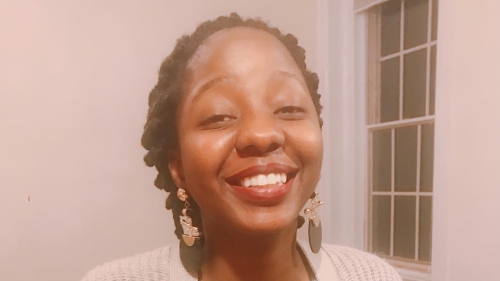
Nicole Salani
Nicole Salani grew up in the village of Mahalapye, Botswana. She completed her bachelor's degree in Economics and Statistics at Williams College. Her interest in unearthing knowledge from data was sparked during a summer internship in Capetown during her sophomore year at Williams.
Nicole is currently studying for an MS in Applied Statistics and is planning to graduate in 2022. After this, she would like to continue to conduct research on human health and behavior. She is interested in the application of data science and statistics in policy implementation around public health, education, and other socio-economic issues that affect people's livelihoods.
With the right statistical and data science tools, she believes that one can uncover and help rectify inequities; or steadily guide the complicated process of recovering from a hurricane and other devastating natural disasters; as well as understand and map the impact of human activities on the environment. She enjoys the feeling of empowerment that comes with leveraging data science and statistics to face such challenges head-on.
As someone who cares about social impact, she would like to see a better world because she believes in Ubuntu (humanity). There is a saying in the region she comes from that is rooted in this humanist African philosophy of Ubuntu: "Umuntu ngumuntu ngabantu" ; "motho ke motho ka batho.” This essentially translates to, “I am because we are and as such we owe it to one another to make the world a better place together, for all of us.” And (selfishly, she feels) it makes her feel good. She thinks that data science and statistics may be a way to achieve this type of impact.
As a PRIISM Opportunity Fellow on the Illinois Department of Corrections (IDOC) project headed by Angela Hawkins at the Marron Institute at NYU, Nicole enjoys collaborating with the team and likes that the work they do might actually change the lives of those who are incarcerated and hence generally tucked away from society's compassionate eyes. There are glaring and cruel inequities within the prison system and there is a lot of work to do to fix that. She is humbled that the team’s work moves the needle on these inequities.
